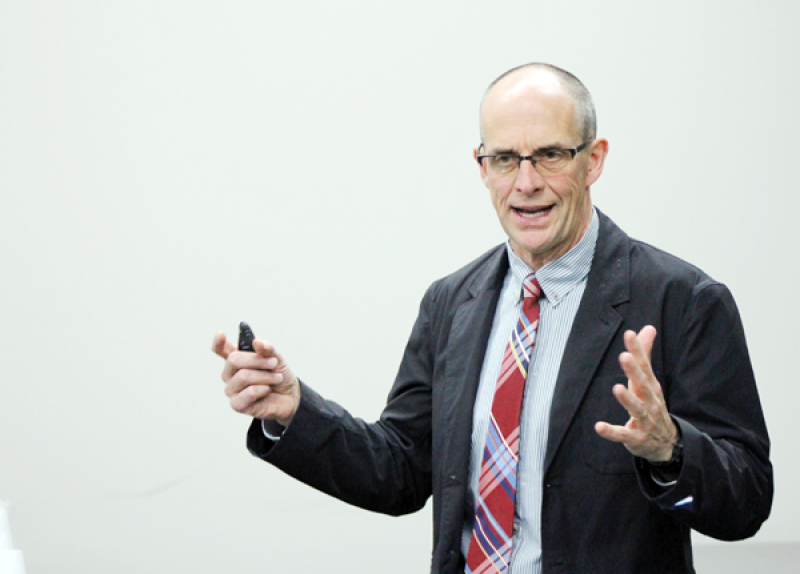
The Christian Reformed Church in North America (CRC)'s Korean ministry held a preaching seminar from January 20 to 21 at Ttokamsa Mission Church in Los Angeles, during which Dr. Jeffrey Weima was featured as the main plenary speaker.
Weima currently teaches New Testament at Calvin Theological Seminary in Grand Rapids, MI. After graduating from Brock University, Weima went on to receive his M.Div. and Th.M. at Calvin Theological Seminary, and then earned his Ph.D. at Wycliffe College in Toronto, Canada. While working at his alma mater, Weima has also been active in various other endeavors, including writing and participating in preaching seminars, among others.
During this recent seminar, Weima spoke for five of the plenary sessions and also preached during the worship service which was open to lay people as well. One of the distinct characteristics of the sessions is that Weima only referred to 1 Thessalonians to speak on various topics such as thanksgiving, a model of pastoring, sexuality, the second coming, and the rapture.
The third session was titled, "Infants, Nursing Mother & Father: Paul's Portrayal of a Pastor and Parishioners," and Weima spoke on the type of pastor that this generation demands.
Referring to 1 Thessalonians 2:1-12, Weima explained that the Apostle Paul's success in ministry led to the anger of people in both the Jewish community and the Gentile community: the former blamed Paul for taking people away from their temples, and the latter blamed him for converting people away from worshiping the Roman emperor or the Gentile gods. Those who opposed Paul accused him of being a greedy person who tricked people by appealing to them. To those claims, Paul makes his defense in 1 Thess. 2:3-6.
"Today's pastors face the same problem that Paul did," Weima said. Some of the most heard include claims that pastors are: lazy people who work only one hour per week; preachers who are full of themselves; greedy people who follow higher salaries; and hypocrites.
To counter the claims made against him by the Thessalonians, Paul begins his defense by using the analogies of infant, mother, and father.
In 1 Thessalonians 2:7 (NIV), in which Paul says, "We were like young children among you," the original Greek for "young children' contains the meaning of "infant.' Paul compared his intentions in ministry to the purity of a newborn infant, emphasizing his innocence.
"Let us evaluate whether we have pure motives just as the Apostle Paul did," said Weima.
Then Paul compares himself to a mother. And not just any mother "” a "nursing mother" (1 Thess. 2:7). Going further, Paul describes a mother who is not caring for other children, but her own.
"The sacred calling that has been given to us has always been the call to love those God has given to us," Weima said.
Weima suggested several ways pastors could check how much they truly love their congregation. Does the pastor know the names of the congregants and the situations they are in? What is the pastor's attitude toward the church administrative staff, worship team, and others who serve? Does the pastor listen to others, or does he only speak his own thoughts? Does the pastor rejoice with those who rejoice, and mourn with those who mourn (Romans 12:15) and join with the congregants in their life journeys?
Finally, Paul compares himself to a father. At the time 1 Thessalonians was written, the father had the ultimate authority.
Weima pointed out that current society's emphasis on equality can cause some to want to neglect the authority of the pastor, and said, "Servant leadership is good, but having contempt for authority figures also has a negative effect."
"When trying to start or do something, pastors should not just wait for the input of the congregation, but must also be able to firmly and boldly cast a vision for the future and lead the way," Weima said.
He also drew the line, adding that he doesn't support those who are prideful or dictatorial to take those positions of authority, but that pastors must also not be afraid of exerting authority to the point of refusing to lead the congregation. Weima encouraged pastors to not hesitate from "living lives worthy of God" (1 Thess. 2:12).
"Don't forget that Paul did not defend himself by using the father analogy first, but made his defense as an infant, a mother, and then a father, in that order," said Weima in conclusion. "Before exerting authority, we must first humbly serve and love the congregation."
This article has been translated by Rachael Lee. For the original in Korean, visit kr.christianitydaily.com.
















